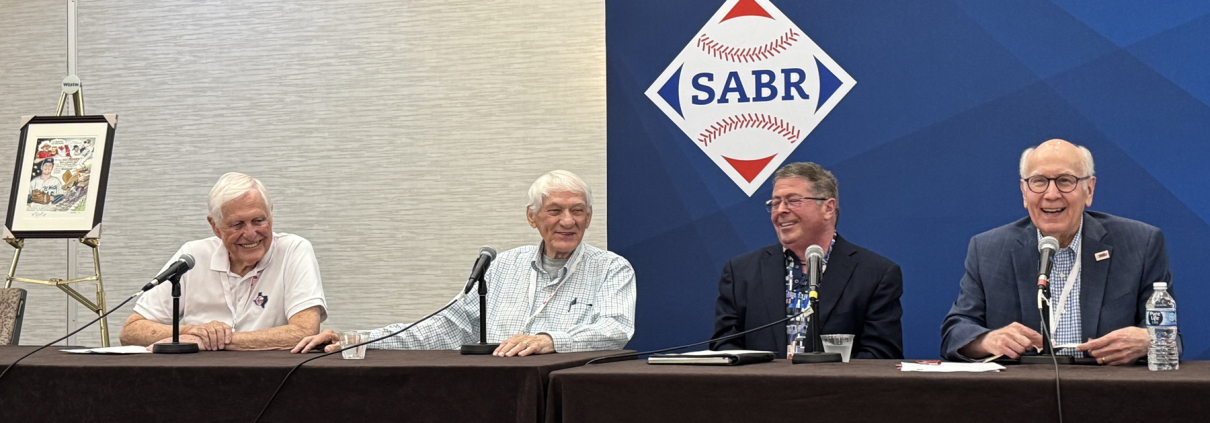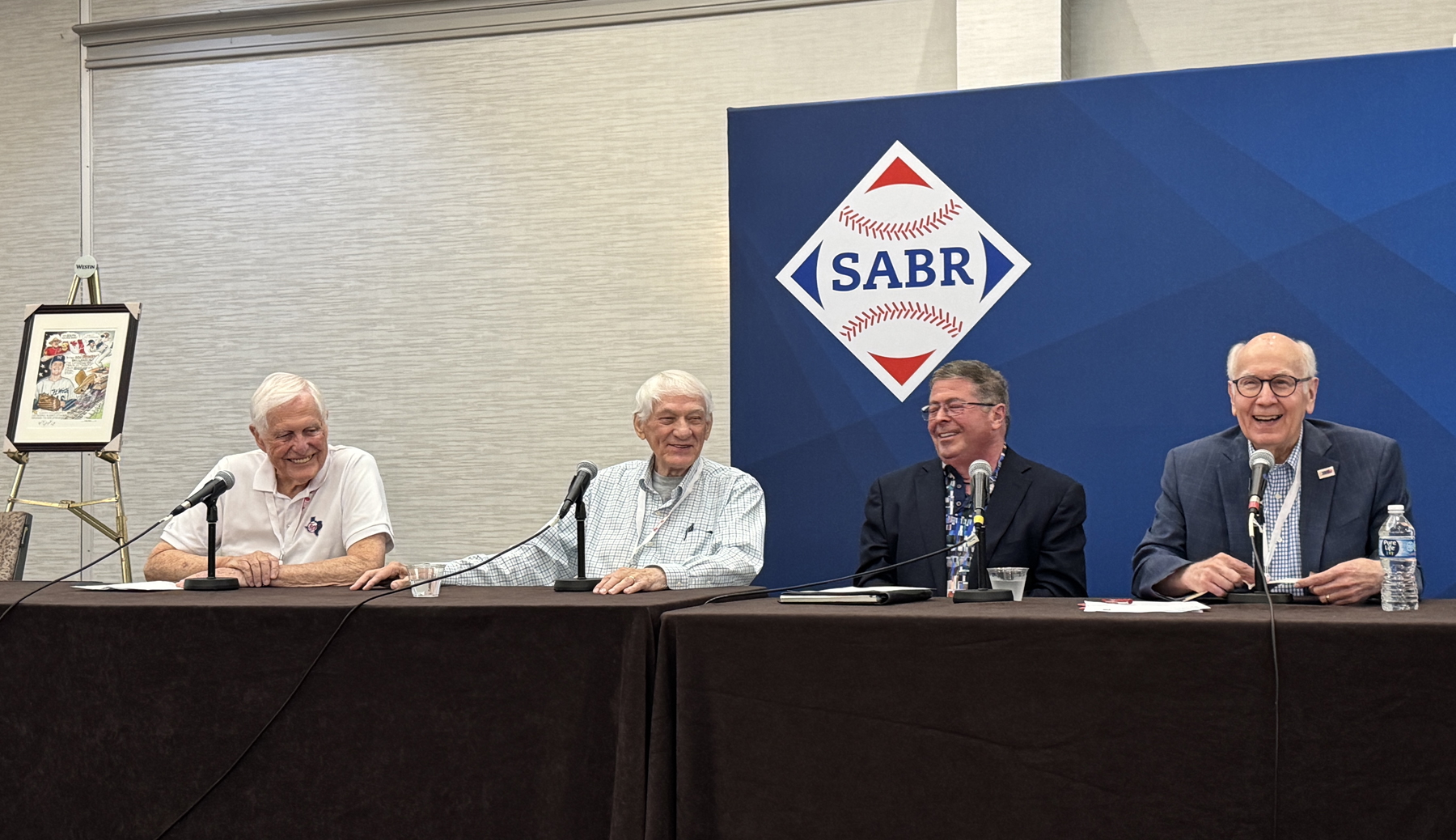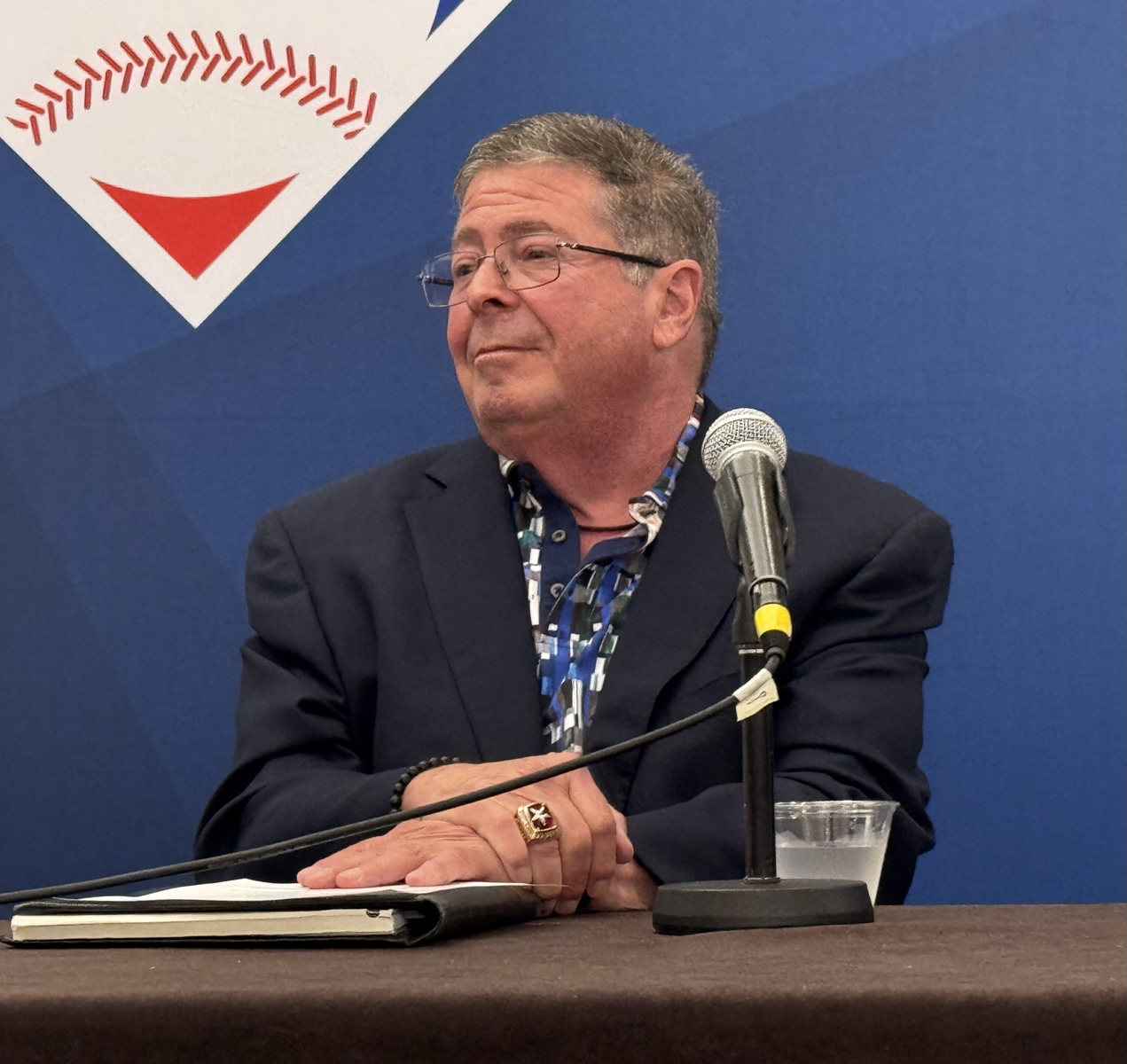SABR 53: Listen to highlights from the Texas Minor League Baseball Panel with Tim Purpura, Rick Herrscher, and Bob Baillargeon
On Saturday, June 28, 2025, the Texas Minor League Baseball Panel was held at SABR 53 at the Westin DFW Airport Hotel in Irving, Texas.
Panelists included Tim Purpura, former President and Treasurer of the Texas League from 2017 to 2021 and a former General Manager of the Houston Astros; Rick Herrscher, who spent seven seasons in professional baseball, including three years in the Texas League with the Milwaukee Braves organization and as an original New York Met in 1962; and Bob Baillargeon, a native of Montreal who spent seven seasons pitching in the minor leagues from 1959 to 1965. The moderator was C. Paul Rogers III, president of SABR’s local Banks-Bragan DFW Chapter.
- Audio: Click here to listen to the SABR 53 Texas Minor League Baseball Panel (57:31; MP3)
Here are some highlights:
ON HIS TENURE AS THE FINAL PRESIDENT OF THE TEXAS LEAGUE
- Purpura: “I did it in, I guess. No, it was a very interesting time. I had just come off a stint working for Minor League Baseball and also with the Texas Rangers. I knew there was a lot going on at the major league level that could affect the minor leagues. But it was an enjoyable time. I picked up on some of the tracks that Tom Kayser had set, most notably the starting of the Amarillo Sod Poodles. I didn’t know a Sod Poodle was something from Texas, I thought they were just making it up. … But I was able to get involved in the construction meetings and see how that evolved. There were some great people in Amarillo and it was really interesting to see how it moved and how it got going. … I knew a lot of people because I had been a farm director and we always had a team in the Texas League. The one thing that was very meaningful to me was the relationship I had with umpires. … When I was at Minor League Baseball, I was responsible for the umpire program and we put together an umpire school with the Florida Board of Education. I decided to take a player development approach to developing minor league umpires. They had to have the technical abilities, of course, but there were people skills and other things that they needed to develop. We got them better food quality in their dressing rooms, we dealt with family issues. It’s amazing the staying power the young (umpires) have to keep gutting things out. … Roland Hemond used to tell me, players come number one. Well, to me, umpires came 1-A, or maybe 1-B, because they were dedicated to the game and gave their all to the game.”
ON GETTING CALLED UP TO THE MAJOR LEAGUES
- Herrscher: “I thought I was going to the Mets when I was traded (by the Milwaukee Braves in May 1962.) But they gave me the ticket and I looked at it. It said Syracuse. I thought, ‘Well, that’s not New York, New York.’ I had to go to the International League and play for a month or so. Then the day before I was going to the Mets, they put me in left field. I had always been an infielder. Bob Bailey hit a shot over my head and I raced into the fence to try to catch it. And my thumb got damaged. They took an X-ray of it. So I’m meeting with (Mets coach) Johnny Murphy when I get to New York and he said, ‘Whatever you do, don’t tell Casey Stengel about your thumb because all we’ve had are injuries around here!’ The trainer fixed up a roll and a rubber tube on my thumb, and I ended up hitting a little bit like Ty Cobb (with a split-handed grip). I ended up hitting like .220 that year, which was kind of a drop-off. I had been told to give it five years and if you can’t make it after five years, you better get something else going. So I applied to dental school. … But first I had to ask Casey Stengel what he thought. He kind of gave it to me straight, he didn’t give me the double-talk. He said, ‘Hershner … he didn’t get names right … go back to dental school.’ And that ended my career.”
ON GOING TO LAW SCHOOL
- Purpura: “I grew up in Chicago as a White Sox fan. It was basically the family religion for generations. I was really drawn into the game. I didn’t have any ability to play the game, but I loved it. When I got done with college … baseball was still ringing in my ear. I was watching batting practice at Jack Murphy Stadium in San Diego one day and I recognized a gentleman from my White Sox days, Roland Hemond. And so I went up to him and said, ‘I’ve followed your career and I’d love to have a chance to get into player development with a major league team.’ And he said, ‘Here’s my one piece of advice: Go to law school, because someday lawyers are going to run the game.’ So I went to law school at night and on weekends in San Diego while working at a university. My first internship was with the California Angels. I would go out to spring training in Mesa, Arizona, and do everything. I was around players and some of the scouts took me under their wing. So I did that for three springs. In 1994, an opportunity came up with the Houston Astros. … And this is where minor league baseball comes in. I’ve had a long love affair with minor league baseball. And it began in 1994 with my first job in baseball.”
ON THE 2024 WHITE SOX ‘BREAKING’ THE 1962 METS’ RECORD FOR MOST LOSSES IN A SEASON
- Herrscher: “It’s tough to take, it really is. I used to talk once in a while with Marv Throneberry and we kind of basked in the glory of being that bad. Who knows, it’s the White Sox now and maybe another team will take it soon. We’re going to try to graciously relinquish our spot as the worst.”
For more coverage of SABR 53, visit SABR.org/convention.
Originally published: July 16, 2025. Last Updated: July 16, 2025.




